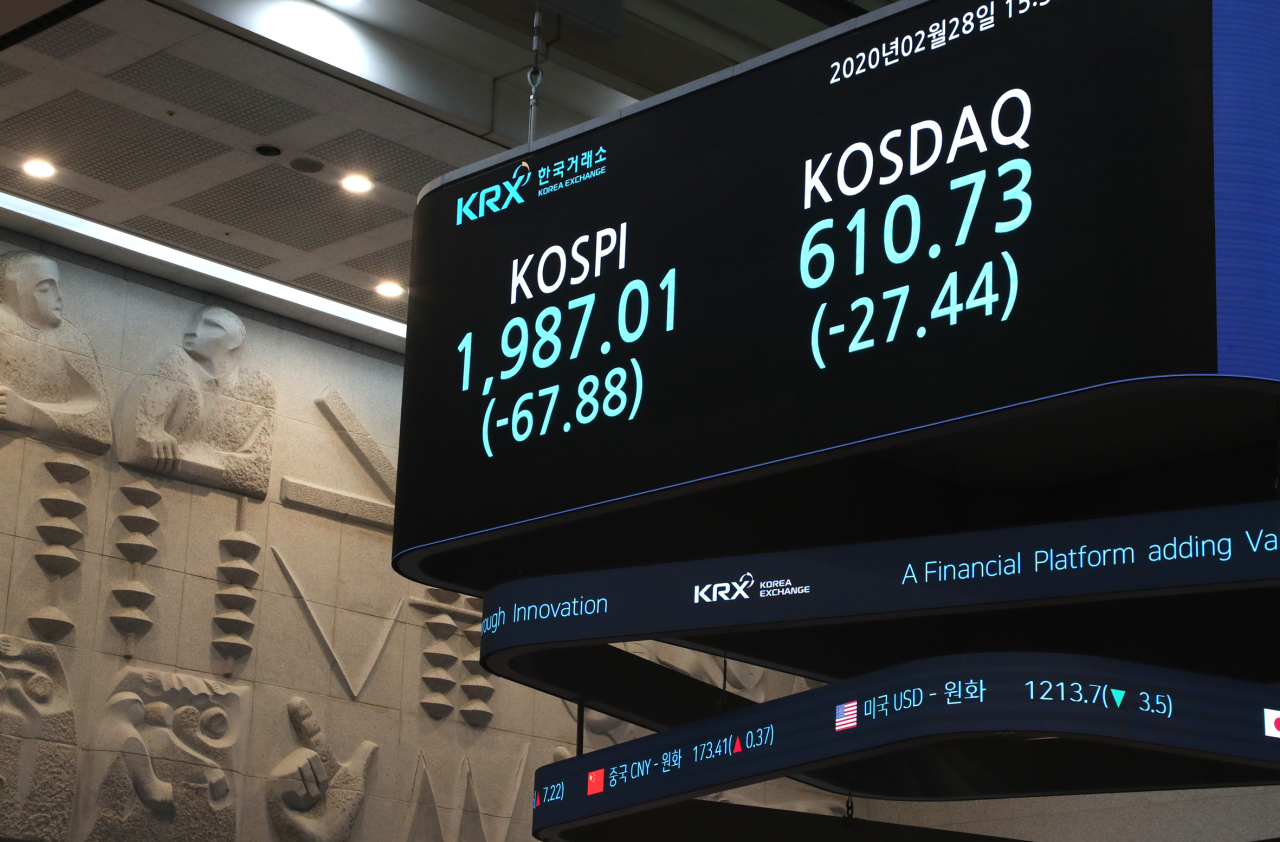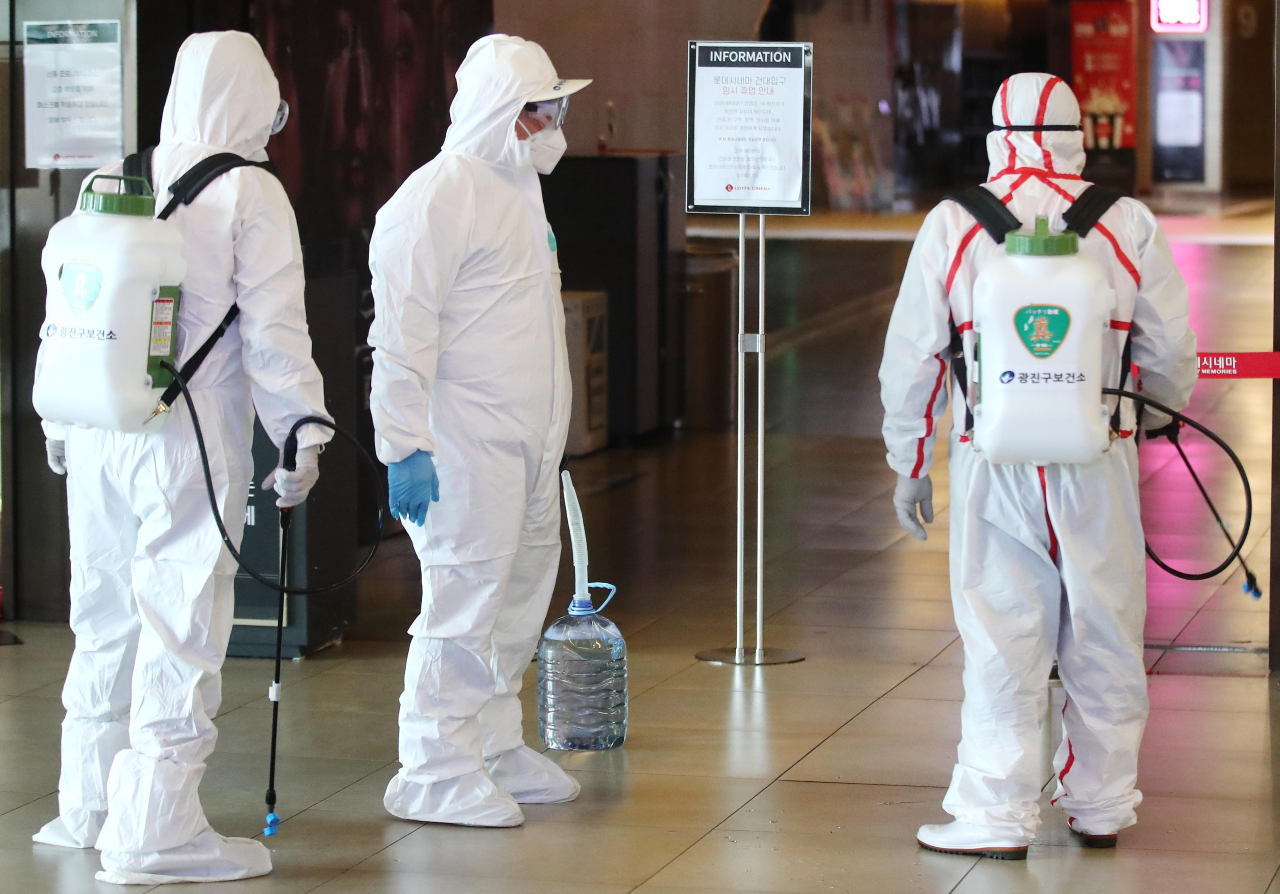Seoul stocks crumble on coronavirus-fueled selling spree
Analysts say extra fiscal budget positive, but market reaction cloudy
By Jie Ye-eunPublished : Feb. 28, 2020 - 18:57

Stocks on South Korea’s main bourse Kospi plunged more than 3 percent Friday with investors dumping assets amid the rapid increase of COVID-19 virus cases.
Market watchers are closely watching how long the selling pressure will continue despite aggressive steps being taken by the government to contain the virus spread.
The benchmark Kospi opened sharply lower at 2,020.17 -- sinking 34.72 points, or 1.69 percent, from the previous session. The weak start continued through the day to close at 1,987.01. The figure is the lowest since the 1,965.69 points marked on Sept. 3 last year. The local currency rose against the US dollar, closing at 1,213.70 won -- up 3.50 won from the previous session’s close.
Foreign investors offloaded 628.50 billion won ($518.2 million) of stocks, weighing upon the bourse. They extended sell-offs for the fifth consecutive session, marking nearly 3.46 trillion won in total.
The tech-heavy Kosdaq also began low at 626.36 -- falling 11.81 points, or 1.85 percent, from the previous session. As individual and institutional investors net-sold a combined 66.80 billion won worth or stocks, it closed at 610.73 -- plummeting 27.44 points, or 4.30 percent, from the previous session. The figure is the lowest since Aug. 30 last year with the mark of 610.55 points.
Most large-caps in the local market were in the negative terrain. Market bellwether Samsung Electronics slid 3.04 percent to close at 54,200 won, while No. 2 chipmaker SK hynix nosedived 5.28 percent to 87,900 won.
The nation’s biggest carmaker Hyundai Motor dropped 4.96 percent as it halted operations at one of its domestic plants after an employee tested positive for the virus infection. The country’s No. 1 chemical firm LG Chem shed 5.15 percent. Leading pharmaceutical firms also lost ground. Shares of Samsung Biologics and Celltrion decreased 3.44 percent and 0.29 percent, respectively. Hanmi Pharmaceutical stocks fell 3.33 percent.
The US stock market suffered its worst week since the global financial crisis of 2008, as investors continued fleeing highly volatile equities. During the Feb. 24-28 period, the Dow Jones Industrial Average absorbed a 12.4 percent decline, while the S&P and the Nasdaq plummeted 11.5 percent and 10.5 percent, respectively.
Amid the sell-off, Federal Reserve Chair Jerome Powell said the US central bank was “closely monitoring” developments.

Some market experts forecast that the Kospi index will respond to future developments on the global virus pandemic. They also warned investors to focus on measures taken by major affected countries, including emergency reactions by governments -- more than 6.20 trillion won budget in Korea to cushion the impact from the new coronavirus outbreak.
“It is true that investor fears have been reflected in the market. The number of infection cases has also rapidly increased, not just in China and Korea, but also in other countries such as Italy,” Kim Ji-san, an analyst at Kiwoom Securities said.
“There are high expectations that the local indexes will rebound after more nations roll out their reflation policies. Next week will be a crucial moment, therefore, investors need to focus more on the related economic events,” he said.
Park So-yeon, an analyst at Korea Investment & Securities, had mixed reaction of optimism and concern over the impact of the government’s extra budget to be spent on containing the virus spread.
“Looking back at the economic measures regarding the past outbreaks such as SARS (2003) and the MERS (2012), the amount of extra budget for the novel virus outbreak is sufficient,” said Park. “After pushing a supplementary government budget of more than 6 trillion won, the Kospi index rose by about 7.2 percent during 200 trading sessions,” she said.
“We hope the government’s policies will drive a positive momentum in the local stock market like in the past. However, it depends how it handles deficit-financing bonds with the extra budget, and the capital market could respond differently.”
By Jie Ye-eun (yeeun@heraldcorp.com)


















![[KH Explains] Hyundai's full hybrid edge to pay off amid slow transition to pure EVs](http://res.heraldm.com/phpwas/restmb_idxmake.php?idx=652&simg=/content/image/2024/04/18/20240418050645_0.jpg&u=20240419100350)

